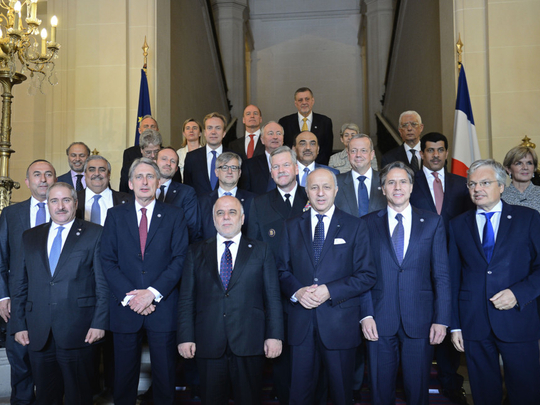
Paris: Iraq’s Prime Minister on Tuesday accused the international coalition fighting Daesh of not doing enough to tackle the terrorist group, and said key members like Saudi Arabia are not curbing the flow of foreign fighters to his country.
He spoke as Western and Middle Eastern countries in the coalition are meeting in Paris. They are pushing the Iraqi government to be more inclusive of its Sunni minority.
The meeting follows the Iraqi government’s biggest military setback in nearly a year. On May 17, Daesh seized Ramadi from the demoralised and disordered Iraqi army. The city is just 90km west of Baghdad and the capital of the overwhelmingly Sunni Anbar province.
Since then, government troops reinforced by Shiite militias have been building up positions around the city. Many of Iraq’s minority Sunnis dislike Daesh but also fear the Shiite militias after years of bloody sectarian strife.
Prime Minister Haidar Al Abadi can only persuade Sunni tribes to fight Daesh if he demonstrates that he can control the powerful militias whose military muscle he now depends on.
He said he was confident those plans were “on track” and rejected suggestions that Iraq was not doing enough politically.
“To be honest, we need a lot of political work on the part of the coalition countries. We need an explanation why there are so many terrorists from Saudi Arabia, the Gulf, Egypt ...European countries. If it is due to the political situation in Iraq, why are Americans, French and German [fighters] in Iraq?” he said.
Al Abadi said his forces were making progress against Daesh but needed more support from the international community.
“It is failure on the part of the world,” Al Abadi told reporters ahead of the meeting, which ministers from 20 around countries, including Saudi Arabia and Turkey, will attend.
“The problem is not exclusively in Iraq. We are trying to do our part, but Daesh was not created in Iraq,” he said referring to the Arabic acronym for Daesh.
Al Abadi said Iraq urgently needed more intelligence and weapons, including anti-tank guns. He said Baghdad had received very little arms and ammunition despite coalition pledges to provide more weapons.
“Almost none. We are relying on ourselves,” he said, adding that he was waiting for UN approval to buy weapons from Iran.
“The air campaign is useful for us, but it’s not enough.
It’s too little. Surveillance is very small. Daesh is highly mobile and moves in small groups,” he said.












